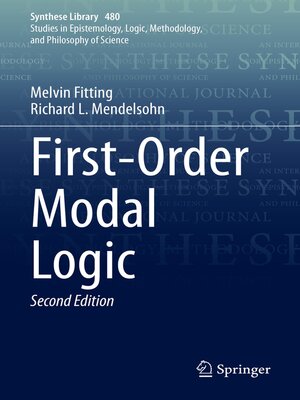
Sign up to save your library
With an OverDrive account, you can save your favorite libraries for at-a-glance information about availability. Find out more about OverDrive accounts.
Find this title in Libby, the library reading app by OverDrive.



Search for a digital library with this title
Title found at these libraries:
| Library Name | Distance |
|---|---|
| Loading... |
This revised edition of the highly recommended book "First-Order Modal Logic", originally published in 1998, contains both new and modified chapters reflecting the latest scientific developments. Fitting and Mendelsohn present a thorough treatment of first-order modal logic, together with some propositional background. They adopt throughout a threefold approach. Semantically, they use possible world models; the formal proof machinery is tableaus; and full philosophical discussions are provided of the way that technical developments bear on well-known philosophical problems. The book covers quantification itself, including the difference between actualist and possibilist quantifiers; equality, leading to a treatment of Frege's morning star/evening star puzzle; the notion of existence and the logical problems surrounding it; non-rigid constants and function symbols; predicate abstraction, which abstracts a predicate from a formula, in effect providing a scoping function for constants andfunction symbols, leading to a clarification of ambiguous readings at the heart of several philosophical problems; the distinction between nonexistence and nondesignation; and definite descriptions, borrowing from both Fregean and Russellian paradigms.
Review of the First Edition: "This Text is an excellent and most useful volume. It is pitched correctly: the exercises are just right... It sets a high standard for anything following. It is to be highly recommended."
(Bulletin of Symbolic Logic, 8:3)
Review of the First Edition: "This Text is an excellent and most useful volume. It is pitched correctly: the exercises are just right... It sets a high standard for anything following. It is to be highly recommended."
(Bulletin of Symbolic Logic, 8:3)







